|
|
|
Sort Order |
|
|
|
Items / Page
|
|
|
|
|
|
|
| Srl | Item |
| 1 |
ID:
140329
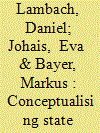

|
|
|
|
|
| Summary/Abstract |
This paper proposes a theoretically grounded and methodologically rigorous conceptualisation of state collapse. It seeks to overcome several key deficits of research into fragile, failed and collapsed states, which is often criticised as normatively problematic and methodologically deficient. We argue that this is a worthwhile topic to study but that scholarly inquiry needs to become more systematic and focus on extreme cases of state collapse. Following a Weberian institutionalist tradition, we disaggregate statehood into three dimensions of state capacity: making and enforcing binding rules, monopolising the means of violence and collecting taxes. We then propose a set of indicators as well as a mode of aggregation based on necessary and sufficient conditions. Our framework identifies 17 cases of state collapse in the postcolonial era.
|
|
|
|
|
|
|
|
|
|
|
|
|
|
|
|
| 2 |
ID:
148477
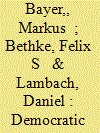

|
|
|
|
|
| Summary/Abstract |
Research suggests that nonviolent resistance (NVR) campaigns are more successful in deposing dictators than armed rebellions. However, ousting dictators is only the first step in the process of democratization. After deposing an autocratic regime, societies enter a transition phase where they must learn to consolidate the gains of democracy and bargain about the new rules of the democratic regime. But even if free, fair, and competitive elections are held, indicating a successful transition to democratic rule, uncertainty about its stability remains salient. In the period that follows, either democracy survives and proves to be resilient, or an autocratic backslide occurs. In this article, we analyze the effect of NVR campaigns on the survival of democratic regimes. Building on the literature on modes of transitions and nonviolent resistance, we argue that those democratic regimes that come into being as a result of a NVR campaign are less prone to democratic breakdown. The main mechanism which produces this effect is that the organizational culture of NVR campaigns spills over to the subsequent democratic regime fostering conditions favorable for democratic survival. We test the effect of NVR campaigns on democratic regime survival using survival analysis and propensity score matching. The results show that democratic regimes that experience NVR during the transition phase survive substantially longer than regimes without NVR.
|
|
|
|
|
|
|
|
|
|
|
|
|
|
|
|
| 3 |
ID:
187078
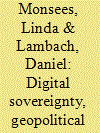

|
|
|
|
|
| Summary/Abstract |
“Digital sovereignty” has emerged as a hot topic in European politics. But although true European digital sovereignty seems unattainable, analysing the digital sovereignty discourse is still useful since it tells us much about European politics. We examine three “projects” which are part of the broader digital sovereignty initiative: 5G, Gaia-X, and the semiconductor industry. This empirical perspective allows for a better understanding of how imaginaries about digital sovereignty play out in these specific tech projects and how these then help to affirm a particular European identity. Methodologically, we focus on how particular geopolitical imaginaries appear in these digital sovereignty projects. Our empirical analysis reveals that Europe’s comparatively weak digital industries are considered a security issue. China and, to a lesser degree, the United States are not only seen as economic rivals but also security threats when it comes to issues such as espionage and data protection. Based on this, we argue that digital sovereignty projects, despite being full of contradictions and tensions, contribute to a distinct EU identity of an agile, future-oriented global player in the digitised economy. This, while not entirely new, is a powerful imaginary even if the proposed idea of “sovereignty” might never be enacted.
|
|
|
|
|
|
|
|
|
|
|
|
|
|
|
|
| 4 |
ID:
172158
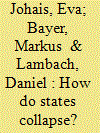

|
|
|
|
|
| Summary/Abstract |
State collapse is a highly consequential event. But we know very little about the reasons why and how states lose their capacities of violence control, rule-making and taxation. In order to explore the underlying causal mechanisms, we use a nested analysis combining Qualitative Comparative Analysis and comparative process-tracing. While the mobilisation of armed opposition groups is a necessary condition for state collapse, it only works in concurrence with other conditions, namely political transitions, repression, factionalism, intra-elite rivalry and external interventions. Thus, the article presents a causal model that shows the alternative pathways leading to state collapse.
|
|
|
|
|
|
|
|
|
|
|
|
|
|
|
|
| 5 |
ID:
175397
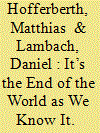

|
|
|
|
|
| Summary/Abstract |
This article contends that practices of, and reflections on, global governance are diversifying without any particular teleology. Therefore, it proposes a “postgovernance” perspective to capture and make sense of the multiplicity of concurrent developments. Just like post-punk followed punk rock and provided new energy, postgovernance provides opportunities to revitalize debates on world politics. Postgovernance allows both scholars and practitioners to consider the persistence of “traditional” forms of global governance as well as the simultaneous emergence of new approaches. This article thus proposes postgovernance as a mode of world politics in a postparadigmatic world that is dynamic yet inconsistent. We advance this argument by outlining what postgovernance entails, by taking stock of current debates from a postgovernance perspective, and by discussing how these can be advanced from a postgovernance point of view.
|
|
|
|
|
|
|
|
|
|
|
|
|
|
|
|
| 6 |
ID:
183712
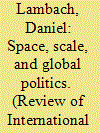

|
|
|
|
|
| Summary/Abstract |
Space matters for global politics but the treatment thereof in International Relations (IR) has been uneven. There is broad interest in spatial aspects across many research communities but only a nascent theoretical discussion and little cross-field communication. This article argues for a fuller engagement of IR scholars with sociospatial concepts and proposes a spatial approach to global politics based on four essential dimensions: a spatial ontology, the constructedness of space, a scalar perspective, and the interaction of materiality and ideas. As one possible way of integrating these aspects into a more specific concept, the article elaborates a framework of spatial practices and uses the example of Arctic Security research to illustrate the upsides of such a spatial approach for IR research.
|
|
|
|
|
|
|
|
|
|
|
|
|
|
|
|
|
|
|
|
|